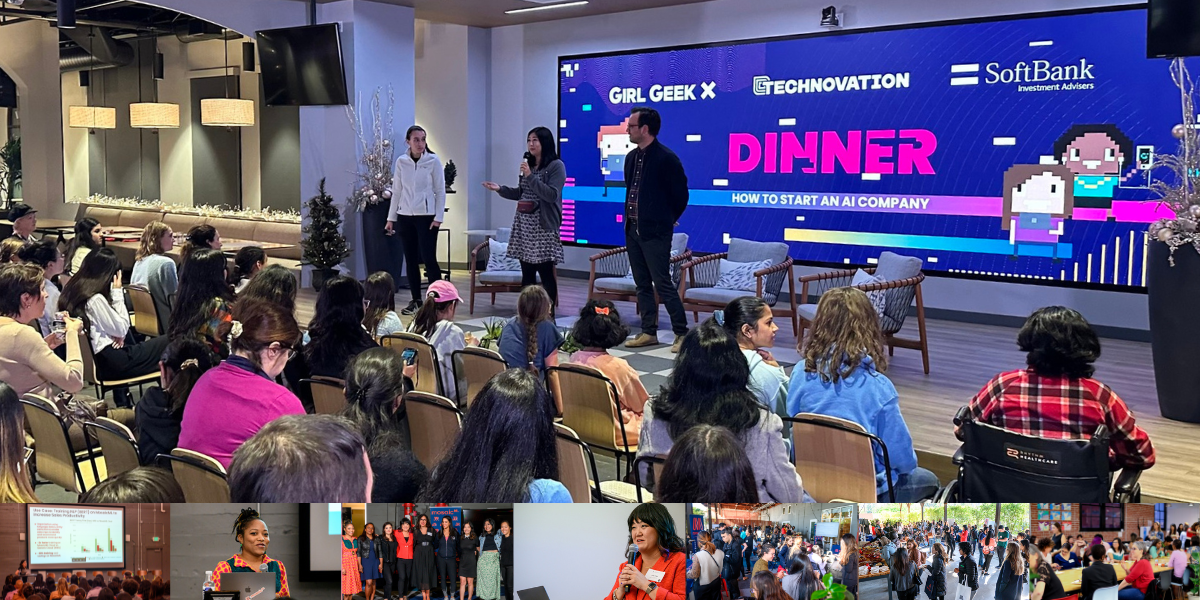This September, Girl Geek X ELEVATE Virtual Conference is happening and your brand has the chance to be featured!
This is your chance to partner on a high-impact gathering — whether a networking mixer or a hands-on demo experience, expertly position your brand in front of 3,000+ women technologists!
• Network directly with 3,000+ attendees
• Branding opportunities online and in person
• Quality leads and curated moments for connection
Here are five unique events a sponsoring company crushed their event goals with:
#1 – Confluent Girl Geek Dinner
Confluent partnered with us to host a Girl Geek Dinner kicking off Kafka Summit, their developer conference for developers, IT, and data engineers. Confluent invited girl geeks to attend Kafka Summit for FREE. Summit passes were valued at $1,195.
At the dinner, Girl Geek X founder Angie Chang speaks with Confluent co-founder Neha Narkhede in a fireside chat about how she built the billion-dollar infrastructure startup. Neha helped develop Apache Kafka to handle all the data at LinkedIn before she left to start Confluent.
Confluent Girl Geek Dinner speakers included Neha Narkhede (Co-founder and CTO, Confluent), Bret Scofield (UX Research, Confluent), Elizabeth Bennett (Software Engineer, Confluent), and Priya Shivakumar (Senior Director, Product Marketing, Confluent). (Video & transcript)
#2 – OpenAI Girl Geek Dinner
Before OpenAI became a household name with GPT, OpenAI hosted Girl Geek Dinners to invite girl geeks to learn about their Residency program. OpenAI Residency is a six-month program as a potential pathway to a full-time role at OpenAI for researchers and engineers who don’t currently focus on artificial intelligence.
The program is ideal for researchers specializing in fields outside of deep learning like mathematics, physics, or neuroscience. The program can also work well for software engineers looking to transition into AI.
OpenAI Girl Geek Dinner speakers included Elena Chatziathanasiadou (Talent Programs Lead, OpenA), Christine McLeavey (Member of Technical Staff, OpenAI), Alethea Power (Member of Technical Staff, OpenAI), Tyna Eloundou (Member of Policy Staff, OpenAI) – (Video & transcript)
#3 – Microsoft Hardware Girl Geek Dinner
When you think about Microsoft, hardware may not be the first thing you imagine.
Microsoft Hardware Girl Geek Dinner hosted interactive demos of their products and innovations in Silicon, HoloLens, and Azure Stack Edge.
Microsoft Hardware Girl Geek Dinner speakers included Aaratee Rao (Group Engineering Manager, Microsoft), Safiya Miller (Strategic Account Executive, Microsoft), Elene Terry (Partner, Silicon and System Architecture, Microsoft), Carolyn Lee (Mechanical Engineer, Microsoft), Shivani Pradhan (Product Manager, Azure Stack Edge compute, Microsoft). (Video & transcript)
#4 – MosaicML Girl Geek Dinner
A startup in a startup co-working space, MosaicML Girl Geek Dinner was the first IRL event since the pandemic lockdown.
The networking and dinner was held outdoors on the enclosed patio, and talks were hosted indoors with the microphone and AV for hosting 120 girl geeks for lightning talks on efficient machine learning training, reinforcement learning, ML-based drug discovery, evaluating recommendation robustness, turning generative models into products, seeking the bigger picture, and more.
MosaicML Girl Geek Dinner speakers included Julie Choi (VP and Chief of Growth, MosaicML), Laura Florescu (AI Researcher, MosaicML), Amy Zhang (Research Scientist, Meta AI), Tiffany Williams (Staff Software Engineer, Atomwise), Shelby Heinecke (Senior Research Scientist, Salesforce Research), Angela Jiang (Product Manager, OpenAI), Banu Nagasundaram (ML Product Leader, AWS), Lamya Alaoui (Director of People, Hala Systems). (Video & transcript)
#5 – Atlassian Girl Geek Dinner
Atlassian Girl Geek Dinner speakers included Aubrey Blanche (Global Head of Diversity & Belonging, Atlassian), Lori Kaplan (Head of Design, Cloud Migrations, Atlassian), Ashley Faus (Senior Manager, Integrated Media, Atlassian), Dominique Ward (Design Operations Lead, Atlassian) Ritika Nanda (Mobile Developer, Atlassian) (Video & transcript)



